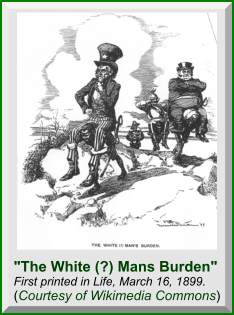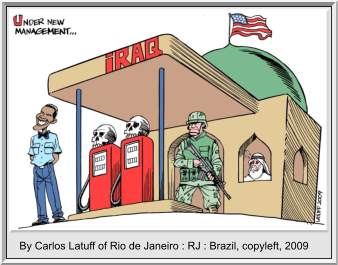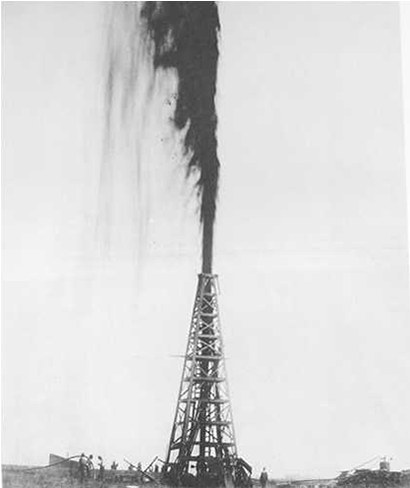This is a rather extensive update of a piece I wrote and originally published in several places in December, 2006. It was updated in November, 2009
Most American politicians and many pundits now concede they were wrong to support Bush’s invasion of Iraq, stating that the administration lied to them about its justification. Politicians who voted to support the invasion, especially liberal politicians, say that the Bush administration lied to them about its reasons for this invasion. It is hard to believe this, especially in the case of bright, educated, and talented people like Hillary Clinton and others. The Bush administration’s phony excuses did not fool many ordinary American citizens, who did not have the same access to information as did the Clinton-style politicians and inside-the-beltway denizens.
 When trying to justify launching this war, the Bush administration and its apologists gave reasons that included:
When trying to justify launching this war, the Bush administration and its apologists gave reasons that included:
- Saddam’s supposed cache of weapons of mass destruction
- Saddam’s nose-thumbing UN weapons inspectors in the face of UN sanctions
- The undoubtedly brutal nature of the Saddam Hussein dictatorship
- The supposed desirability of creating an Arab democracy that would serve as a beacon in the Middle East, the latter a more “politically correct” and polite version of early 19th century meme of carrying “white man’s burden” and securing the “blessings of western civilization.”
But the truth is that none of these stated reasons were the real reasons for this war. These currently transparent excuses were really nothing more than a now-failed public relations ploy.
As demonstrated below, the American corporate rulers had planned this war a decade before the initiation of hostilities. This war planning had always been about control of energy resources and marketplaces, not democracy, not terrorism, not Islam.
Moreover, this war was not an aberration from American moral principles that supposedly guide its foreign policy. It was the natural outgrowth of a longstanding foreign policy, a strategy that stems back from the days of the Spanish-American war of 1898 and before.
Consider my reasons for stating this:
A modern national economy runs on energy. Without energy, a modern economy is not possible. Coal can produce energy for much manufacturing as China shows us, but it’s petroleum that makes large-scale agriculture and distribution of commodities at all possible.
Unfortunately for the world’s ecology and the human race, this will continue to be the case for the foreseeable future. Governments and research institutes are exploring alternatives, but no real large-scale replacement of petroleum is likely to come on line for several decades or more.
That’s why modern nation states view access to petroleum at low prices to be a national security issue. A superpower’s status correlates directly with the degree of control over energy production and marketing in the context of a globally interlinked network of market economies.
Insofar as access to and control of energy resources are located abroad, the would-be superpower must tend to develop an assertive and interventionist military and an aggressive foreign policy.
And in selling this military and foreign policy to its own citizens, the superpower’s need to justify what in essence is an imperialist foreign policy can dominate a large part of the political life of a country. This is the case in the United States today.
At the beginning of the 21st century, there is only one superpower, the United States. But the US seems to face two potential rivals for global economic domination in China and India. Additionally, the European Union is a potential third superpower rival. So if the United States wants to maintain its status as the dominant world power, it must tightly hold onto the world’s gas pump and control the flow and price of energy to China, India, and Europe. That iron imperative forms the strategic underpinning of US policy towards China, India, and Europe.
The current American president, Mr. Barack Obama, said this in his acceptance speech in November, 2008, after he won the election:
And to all those watching tonight from beyond our shores, from parliaments and palaces to those who are huddled around radios in the forgotten corners of our world – our stories are singular, but our destiny is shared, and a new dawn of American leadership is at hand. To those who would tear this world down – we will defeat you. To those who seek peace and security – we support you. (emphasis added)
President Obama followed this up talking about American strength coming not from military and economic power, but from the “enduring power of our ideals: democracy, liberty, opportunity and unyielding hope.” However, those pretty words should be seen as as public relations ploy to sell the desirability of a “shared destiny” under “American leadership.”
The crucial part of President Obama’s message lies in that part about the United States’ desire to assume the role of “world leadership” and determination to “defeat” those who oppose that very US “leadership.”
And it’s not just conjecture that the USA seeks political and economic hegemony in the coming century. Nor is this strategic posture a recent innovation. Consider this:
On January, 28, 1998, the Project For A New American Century (sometimes abbreviated as PNAC), an important so-called neoconservative think tank, wrote a letter to President Clinton about what they thought should be done with Iraq. They proposed “regime change.” That is to say, they proposed a preemptive invasion and the toppling of a foreign government via an unprovoked war for economic advantage on the world economic stage. Here are some quotes from that letter:
As recent events have demonstrated, we can no longer depend on our partners in the Gulf War coalition to continue to uphold the sanctions or to punish Saddam when he blocks or evades UN inspections. Our ability to ensure that Saddam Hussein is not producing weapons of mass destruction, therefore, has substantially diminished. ……if we continue along the present course, the safety of American troops in the region, of our friends and allies like Israel and the moderate Arab states, and a significant portion of the world’s supply of oil will all be put at hazard. (Emphasis added)
The solution, as far as the signers of this letter are concerned, to put it crudely, is to overthrow the Saddam Hussein regime and to install another one that will be more amenable and obedient to American pressure. From the same letter:
In the near term, this means a willingness to undertake military action as diplomacy is clearly failing. In the long term, it means removing Saddam Hussein and his regime from power. That now needs to become the aim of American foreign policy. …..We believe the U.S. has the authority under existing UN resolutions to take the necessary steps, including military steps, to protect our vital interests in the Gulf. In any case, American policy cannot continue to be crippled by a misguided insistence on unanimity in the UN Security Council. (Emphasis added)
Remember, this was years before the 9/11 attack in New York. So just who are these people who constitute PNAC? Who are they who had the chutzpah to call for the preemptive invasion and overthrow of a sovereign government, even in the face of worldwide disapproval?
Who were those worthies who, in January of 1998, 3-plus years before 9/11 and 5-plus years before the invasion of Iraq, called for using military force in the name of  guaranteeing Americas “vital interests in access to oil” to safeguard such “moderate” regimes as Saudi Arabia, (whose law is a very severe form of Shariah) and Egypt (which is a dictatorship), as well as Israel?
guaranteeing Americas “vital interests in access to oil” to safeguard such “moderate” regimes as Saudi Arabia, (whose law is a very severe form of Shariah) and Egypt (which is a dictatorship), as well as Israel?
Why, oddly enough, they happen to be the same people who designed the Bush Administration’s wartime policies……the very same people!
And among those who signed and endorsed this extraordinary letter are such former Bush administration operatives and apologists as Donald Rumsfeld, John Bolton, Paul Wolfowitz, Elliott Abrams, Richard L. Armitage, Richard Perle, William J. Bennett, Robert Kagan, Zalmay Khalilzad, William Kristol, and Robert B. Zoellick.
Here’s how PNAC managed to become the designers of the Iraq war.
According to PNAC’s Statement of Principles, it started in 1997 to promote a shift in US foreign policy towards an enhanced use of an augmented military presence. Signers of that Statement of Principles included many of the above signatories and a few others, including former vice president Dick Cheney and his disgraced chief-of-staff Scooter ( I. Lewis) Libby, implicated in the Valerie Plame affair.
In 2000, a few years later, PNAC expanded on this in a 90-page paper called Rebuilding America’s Defenses (sometimes abbreviated as RAD), which sought to lay out a road map for America’s foreign policy as the Bush administration was coming into power. RAD’s introduction says the following:
Indeed, the United States has for decades sought to play a more permanent role in Gulf regional security. While the unresolved conflict with Iraq provides the immediate justification, the need for a substantial American force presence in the Gulf transcends the issue of the regime of Saddam Hussein.
In broad terms, we saw the project as building upon the defense strategy outlined by the Cheney Defense Department in the waning days of the Bush Administration. The Defense Policy Guidance (DPG) drafted in the early months of 1992 provided a blueprint for maintaining U.S. preeminence, precluding the rise of a great power rival, and shaping the international security order in line with American principles and interests.
Note the strategic concern with “precluding the rise of a great power rival” and “maintaining U.S. preeminence.” This is an apology for a nakedly imperialist foreign policy and inter-imperialist rivalry.
Dick Cheney, the Secretary of Defense during this time under the first Bush administration, had had Paul Wolfowitz draft a document called the Defense Policy Guidance (DPG).
This document was leaked to the New York Times and The Washington Post. When it hit the public consciousness, there was a huge political storm.
You can read Wikipedia’s article about it here and the New York Times documentary coverage here, where you’ll find this passage:
The U.S. must show the leadership necessary to establish and protect a new order that holds the promise of convincing potential competitors that they need not aspire to a greater role or pursue a more aggressive posture to protect their legitimate interests. In non-defense areas, we must account sufficiently for the interests of the advanced industrial nations to discourage them from challenging our leadership or seeking to overturn the established political and economic order. We must maintain the mechanism for deterring potential competitors from even aspiring to a larger regional or global role. (Emphasis added)
Such are the real reasons for the United States’ foreign policy vis-à-vis Iraq in particular and the middle east in general. American foreign policy has everything to do with control of marketplaces and resources, of “convincing potential competitors that they need not aspire to a greater role or pursue a more aggressive posture to protect their legitimate interests.”
While the DPG document’s words have the virtue of being frank, they have precious little to do with what President Obama calls the “enduring power of our ideals: democracy, liberty, opportunity and unyielding hope.”
Although the naked language of Wolfowitz’s DPG document is mighty poor theater indeed, its author should be forgiven for this breech of good table manners.
After all, Cheney and Wolfowitz never intended that the squeamish American public should actually lay eyes on these sober words, less they begin to suspect that perhaps they ultimately don’t determine public policy at the ballot box.
Oh no! This document was meant to be read by the actual wielders of political power, the financiers, the war planners, the executive committees of what can only be called the ruling class. And it was merely an accident of history that it ever got a public airing.
And when this gruesomely Machiavellian document fell into the bright light of public awareness, it caused a political firestorm, as it had been commissioned by none other than the redoubtable Dick Cheney, in his official capacity of Secretary of Defense (which is Orwellian language for what used to be called Secretary of War before the end of the Second World War).
Both the Democratic and Republican party claim they represent the national interests of the United States. What they really attempt to defend are the corporate interests and the interests of American finance capital on the world stage, foremost among them the banking, insurance, financial services, manufacturing, pharmaceuticals, “defense,” and the petroleum industries.
As anyone reading the current news must realize, the Democrats and Republicans surely hate each other immensely and continuously try to undermine each other while smiling at each other most civilly. That enmity is real and comes about because they seek to represent different factions of the corporate plutocracy that actually rules the United States, and they have different tactical approaches to achieving their shared strategic goal: the perpetuation of “American leadership” in the world capitalist system.
These rival factions battle over policy issues; that is to say, over which tactics best serve those “American national interests,” by which they mean American corporate international domination, control of resources and marketplaces.
Nevertheless, despite the viciousness of the Republican Party-versus-Democratic Party tactical spats, their long-term strategic interests remain identical.
Fundamentally, the Republicans and the Democrats do not really disagree about whether the US should be the dominant economic and political in the world, or (as PNAC unapologetically says) the world’s constabulary power. They differ only in when and how to balance the use military tactics to best advantage with the use of diplomatic blandishments and economic threats. Their disagreement is not whether the United States has any right to impose its “leadership role” on the rest of the human race.
The Difference Between The Liberal Doves And The Conservative Hawks
On the one hand, some of the Democratic Party’s so-called liberals originally opposed military intervention in Iraq because they thought it would ultimately  be counterproductive to “American national interests.” Such liberals (for example, the then Senator Obama), feared military intervention threatened to destabilize the region so much that it would endanger America’s overall Mideast policies.
be counterproductive to “American national interests.” Such liberals (for example, the then Senator Obama), feared military intervention threatened to destabilize the region so much that it would endanger America’s overall Mideast policies.
What those critics of the proposed invasion instinctively feared above all else was that a real revolutionary upheaval might replace the present middle eastern corrupt dictatorships and upset the power balance there, which in turn might threaten American control of marketplaces and resources and America’s role as “leader of the free world.”
On the other hand, the so-called neoconservatives also feared that control of  Mideast politics and resources would spin out of the United State’s control. But they felt the danger came not from alienating the masses of the middle east with a brutish show of strength but because the USA was far too wary of offending their allies. They feared the appearance of weakness and lack of resolve would embolden those who chafed under the United States playing a leadership role.
Mideast politics and resources would spin out of the United State’s control. But they felt the danger came not from alienating the masses of the middle east with a brutish show of strength but because the USA was far too wary of offending their allies. They feared the appearance of weakness and lack of resolve would embolden those who chafed under the United States playing a leadership role.
So they advocated a more naked intimidation, the “shock and awe” school of control that could deter “potential competitors from even aspiring to a larger regional or global role.”
In the coming months and years, we shall see if the neocon rationality made more tactical sense in serving the foreign policy goals of American plutocracy than did the liberal rationale.
The United States may yet suffer a historic defeat in Iraq if the Iraqi government collapses while or shortly after the US withdraws its last forces, perhaps withdrawn to shore up another shaky and unpopular puppet in Afghanistan.
If and when the Iraqi government collapses and plunges that unfortunate country into yet another orgy of bloodletting, there will suddenly be a large and vicious argument about “who lost Iraq,” and all that sweet talk about bipartisanship and looking to the future instead of the past will become very unfashionable indeed.
What will not be discussed is whether advancing the interests of the average “middle class” American has, or ever has had, anything in common with advancing the interests of the American corporate plutocracy. No one will critically analyze what “American national interest” actually means in terms of the average American or, for that matter, world citizen.

Amen Brother Truth-Seeker… No arguements from this choirboy!
How important a role do you think religion played in Bush’s rational?
Bush referred to the war as a ‘crusade’ several times on tv… pandering to his base, rallying the troops, or a Freudian slip?
He is, afterall, an unabashed Evangelical who believes, quite literally, in the second coming and all that stands in its way… and that he feels he has a divine role to play in it!
It’s too scary to contemplate that such religious nonsense could lead to a military invasion of another sovereign country.
Yet, Bush chose to consult with and seek guidance from his ‘Lord Father’… not his real father Bush(41)… or his Secretaries of State or Defense?
I think our next president should be a Buddhist… about 1/3 the worlds population & nontheistic! Hell, even the Dalai Lama knows ‘miracles are nonsense – and that he is just a man’!